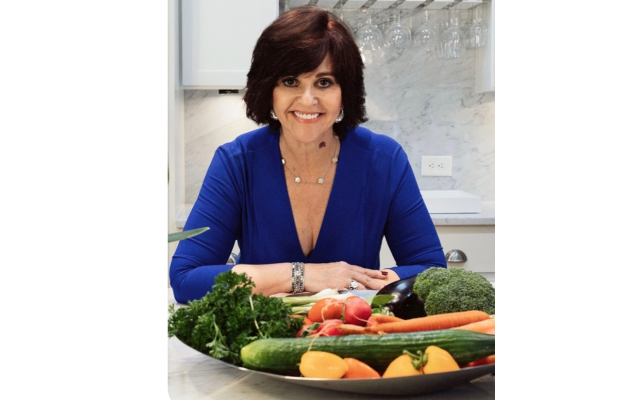Dietician’s 10 Smart Tips for 2019
Industry veteran, Sheryl Westerman, believes that weight loss has many different components, starting with changing the way you think.
After 37 years with the Atlanta Journal-Constitution and now with the AJT, , Jaffe’s focus is lifestyle, art, dining, fashion, and community events with emphasis on Jewish movers and shakers.
Sheryl Westerman has 40 years of experience in weight loss counseling, coaching, research and motivational lecturing. She believes that weight loss has many different components, starting with changing the way you think.
“I was an overweight child and understand the difficulty of a weight loss journey, … Where most diet programs talk solely about food, they do not address the underlining factor, which is changing your mindset. Our bodies all have different energetic needs and need to be nourished consistently to maintain optimum levels of energy and keep our metabolisms going.”
Westerman was reared in South Africa and is constantly looking for new ideas, like the launch of her cookbook, “Cooking with Sheryl Westerman” (March 2019). ThreeBestRated, which reviews American companies, ranked her number one among the top three hand-picked weight loss centers in Atlanta in 2018.
Here are her 10 tips for losing weight, having more energy, and being healthier in 2019:
1. Eat breakfast, lunch, and dinner and have healthy snacks available. If 10 is full and 0 is empty, never allow yourself to go below 4. Protein bars are the new “in thing.” My favorite protein bar is NuGo. It is totally delicious, high in protein, satisfying, kosher and pareve.
2. To be successful, you have to set a consistent daily routine (including weekends). Eat at the same times every day. This way your body will start recognizing your new way of eating, and it will stop storing energy as fat. Try to eat dinner early, as late eating is definitely a negative factor in trying to lose weight.
3. I do not believe in fad diets. If something is too good to be true, it usually is. They are all wasted suffering. Depriving yourself does not work in the long term. Losing weight is all about a common-sense way of eating. I believe the biggest challenge is changing your mindset. Pace yourself and be patient. Do not jump on and off the scale every day, it will drive you crazy. Weigh twice a week at most. If you are overwhelmed with too much information, go and see a nutritionist. Portion control is extremely important. You can gain weight by eating too much healthy food.
4. Nothing can ruin a diet like anxiety and stress. Anxiety makes you rush through eating, as does unconscious, mindless eating. Nothing you eat will take the stress away. No matter the situation, you cannot “feed a feeling.” The worst thing you can do is to say, “I don’t care.” We are all human. Trying to be perfect is a toxic journey. If you have a slip up, then freeze the moment. Tell yourself to get back on track now and minimize the damage.
5. Exercise is very important to speed up your metabolism. If you are a beginner, exercise physiologists believe that 15 minutes in the morning and 15 minutes later in the day, three to four times a week, will make a huge difference. Exercising will reduce your stress levels. If you exercise intensely and don’t see the results on the scale and are frustrated, it is because 80 percent of weight loss is food and the other 20 percent is exercise. You cannot “out exercise” bad eating.
6. Drink water. Being well hydrated burns more calories. Try to drink eight, 8-ounce glasses of water per day. If you do not like drinking cold water, try herbal teas. Sparkling water is also another option.
7. Two squares of dark chocolate a day will not be the deal breaker. Weight loss is about moderation and self-control. Watch your alcohol intake because alcohol is liquid sugar. You can have a small piece of challah and a little wine on Shabbat. I do not believe in “no carbs.” Why would you want to suffer? This has to be a soft landing. You need all your food groups: protein, starch, fats, dairy, and fruit. … A balanced diet will become a lifestyle change.
8. Cooking at home is good for your wallet, waistline and well-being. Make a resolution to not eat out so often because portions are usually bigger, have more sodium, and sauces all have hidden calories at restaurants. There is nothing like having chicken soup when you do not feel well. Kosher chickens taste better than others. (Ina Garten, the world famous “Barefoot Contessa,” also stated that in her book).
9. Get enough sleep. Sleep deprivation makes you feel fatigued. This can result in needing to stay awake by needing more snack foods, junk foods and caffeine to get through the day.
10. Failing to plan is planning to fail. Make sure you buy your essential foods weekly and cook on a Sunday, prior to the week ahead. An Instapot is easy if you have nothing prepared. It is a multi-versatile cooking appliance that has enough high-power energy to cook frozen foods quickly. Never go to the supermarket hungry. Make a list and shop the outside perimeter of the grocery store.
Westerman’s motto is: “Nothing tastes as good as thin feels.”




comments